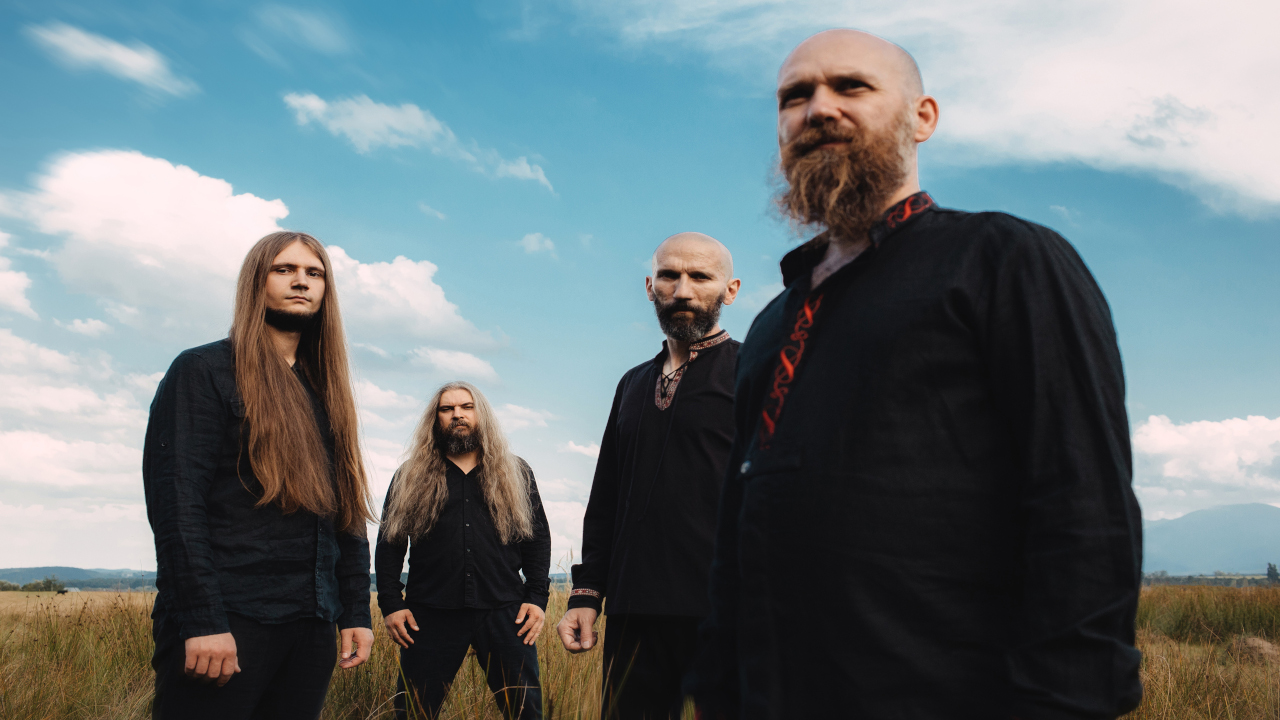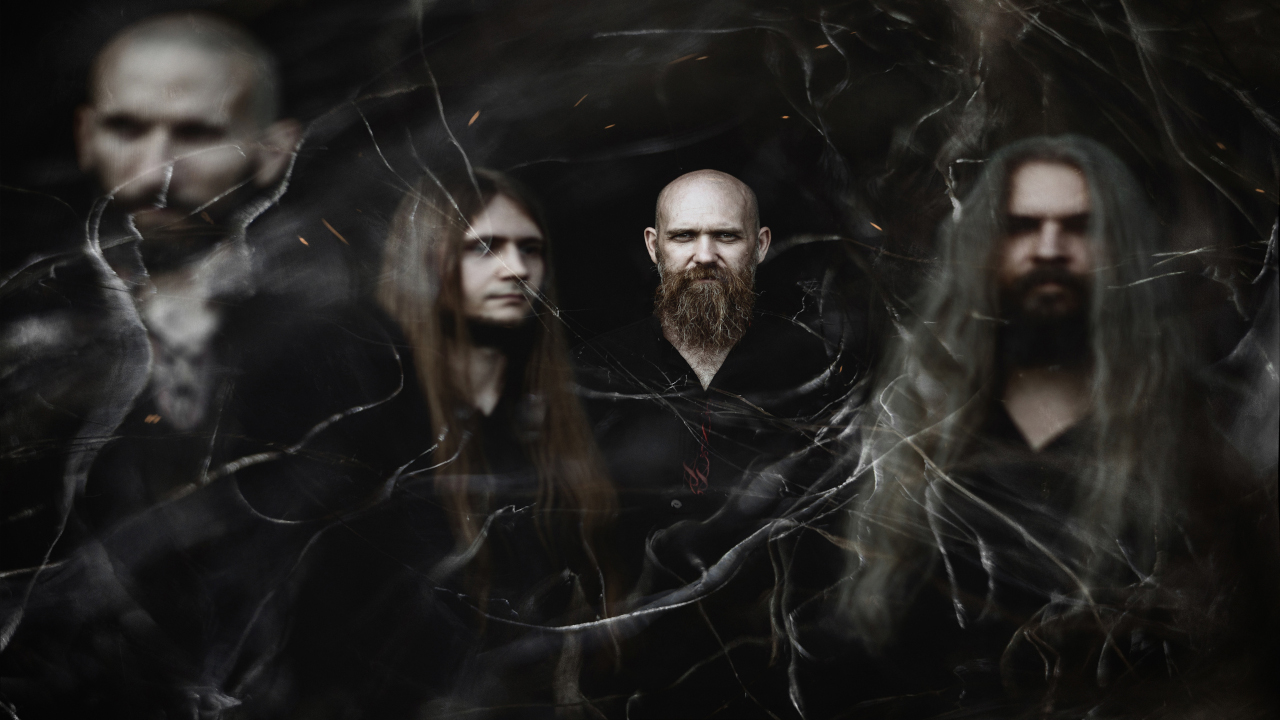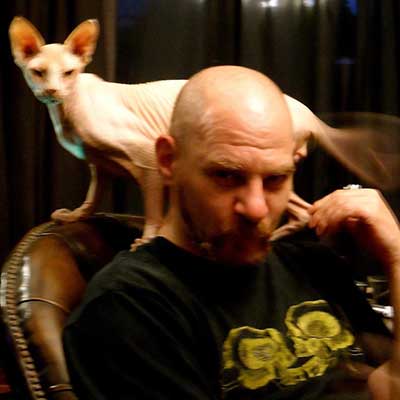"I should not be making music anymore,” says Dordeduh frontman Edmond ‘Hupogrammos’ Karban. “I’ve had my time. I’ve played the greatest festivals in Europe, I was in Romania’s first black metal band, and the first metal band from the country to sign to an international label. I could easily lay down my guitar and say I did my thing. And yet this is an album that I still felt I had to make.”
Edmond is speaking from his new home in the verdant hills of Banat, two hours south of his birthplace, Timişşoara, in the Romanian, much-fabled region of Transylvania. He’s reflecting on both the career-wrecking effects of the pandemic – he was a studio and live engineer until COVID-19 broke out – and a devout, revelatory and often turbulent 27-year musical journey that put his home country on the metal map while forever altering the black metal landscape in its wake.
As songwriter and co-founder of black metal visionaries Negură Bunget, his exploration of native folklore and spirituality took him from the most underground of beginnings to helming a revered, ever-evolving entity that reached its zenith with their fourth full-length, 2006’s Om. Utilising traditional instrumentation such as the tulnic alphorn, the nai pan flute and the toacă˘a – a hammered wooden block hung from a frame, once used as a call to prayer – it was an album of fierce and otherworldly wonder that resonated on the most rarefied yet primordial of levels. It’s regularly cited as one of the greatest black metal albums ever made.
Negură Bunget weren’t able to bask in its glory for long. Long-running tensions between Edmond and his fellow band founder, drummer Gabriel ‘Negru’ Mafa, led to an acrimonious parting of ways three years later. He wouldn’t know it then, but Edmund would never get to speak to Negru again.
When Dordeduh emerged from the ashes in 2010 with the Valea Omului EP, and the debut album, Dar De Duh, two years later, it was clear that this was a different beast. It was obviously the work of the same artist – the traditional instruments, Edmond’s signature, tantric-shudder tremolo riffs, the intrepid, veil-of-reality-piercing sense of purpose all remained – but the tremulous atmospheres had been dialled down for something more progressive. Where Om sounded like it was inhabiting a transitional, in-between realm, Dordeduh’s shape-shifting was accompanied by a greater sense of presence – less a dive into the mysterious, more an experience of the kaleidoscopic nature of being. Then, silence.
“We nearly completed an album five years ago,” says Edmond, “but it would have been just a natural progression from Dar De Duh. So we said, ‘OK, let’s just forget this material.’ I didn’t want to repeat myself. Even with Negură Bunget you won’t find two albums that sound the same.”

Eight years after Dar De Duh, a worthy successor has finally appeared. Har (‘Grace’, in all its non-denominational meanings) is a vast broadening of horizons, steeped in the romantic essence of Edmond’s homeland but revealing a host of new pastures to explore. It’s one of those rare albums whose total conviction, masterfully commandeered adventurism and pristine yet out-of-time soundscape marks out a singular yet universally resonant spiritual path.
If there is one other artist who offers a parallel with Edmond’s journey, however, from Negură’s debut album, Zîrnindu-să (‘Into The Nightshade’) to the sheer artistry and unbound possibilities of Har, it’s Emperor vocalist and solo artist Ihsahn. “I still believe that In The Nightside Eclipse is the best black metal record ever made, and I still have high regard for Ihsahn,” he says. “You realise pretty quickly that this is a guy who knows what he’s talking about, and this is important. I really believe in the integrity of black metal. You need to be impeccable with your own approach, to be able to stare into the abyss and straight in front of darkness.”
For Edmond, that willingness not only to face your own demons, but to commit yourself fully to engaging with those uncanny realms at the edges of our senses, began long before he found the perfect form to express it. “For me, spirituality is something that began earlier in life, but it’s not a virtue in the way that people who go, ‘Oh, I’m so spiritual’ would describe it,” he relates.
“Particularly in my adolescence, having that connection wasn’t something desirable, it was something I wanted to put aside and not think about. It’s not necessarily a positive experience, because if you are authentic in how you deal with it, it can be a really big burden. When you’re oversensitive, and you feel shitloads of things for shitloads of people, that starts to affect you, no matter how strong you think you are. It’s not something I often talk about, but I’ve had my fair share of these kinds of experiences, and although I’m lucky I understood this early on in my life, I developed anxieties and depressions, and I can’t say that I’m over them even now.”
It’s testament to Edmond’s ability to gain perspective on his experiences that Har manages to journey between darkness and light, through passages of elemental, blackened surges and transcendent, psychedelic splendour with the deftest, most holistic of touches. No more is this balance apparent than in the video for the track Desferecat, where Edmond and his musical partner, Sol Faur, who left Negură Bunget alongside him, engage in a series of rites, from incense-infused meditation through acts of suspension portraying the Hanged Man tarot to ceremonious, mace- and spear-wielding destruction of straw figures.
“I really wanted to incorporate a ritualistic aspect on this album,” says Edmond, “and with that video, I wanted people to understand the violence that is happening within yourself when you are going on a really deep, serious journey. It’s not like this mumbo jumbo positive thinking. When you really want to dive into this shit, you will really fucking meet your own darkness. When you shatter your demons, it may embody a lot of positive elements, but it will definitely embody all the negative ones too, because you are embracing your fear. Fear is where you are vulnerable, and you need to clear it out, but the path is never easy.”
In September 2014, Edmond’s estranged bandmate, Gabriel, passed away from a heart attack. He was only 42. With so much history having passed between the both of them, and with so much left unsaid, it left Edmond with a new Rubicon to face up to and cross.
“I will tell you something. He died on my fucking birthday. So when people told me what had happened, I thought it was a fucking joke. So, of course, there were a lot of personal feelings that were bound up in his death, but there was a lot of grief in the whole story. There were lots of things that were left unsaid, but there were things that were unsaid when we were still performing together, for many, many years, and I accept my own responsibility for that.
“I always thought, 30 years would pass and we’d be able to sit down and just clear out all the shit,” Edmond continues, “because nobody is winning if you carry all this tension throughout your whole life. And I’m sorry I didn’t have the opportunity to clear everything up with him. But I actually went to his burial, with Sol, and I actually met his mother, who I had a really good relationship with as a kid, and for me and Sol, we went to pay our respects, and we both felt that something was lifted.”
The cover for Har, created by in-demand artist Costin Chioreanu, is an appropriately elegant expression of the hard-won sense of liberation that permeates the album. It depicts a figure traversing the elements of earth and fire, air and water, undergoing an all-encompassing moment of epiphany. As much as Dordeduh deliberately shy away from referencing their homeland’s history, they touch on something fundamental within it. As Edmond explains, the name Transylvania is literally founded on transcendence – ‘the land beyond the forest’, and the perilous journey one must undertake to seek freedom on the other side.
“It isn’t even just folklore,” says Edmond. “There are many parts around here that are kind of spooky when you experience them. But the point is, everyone must find their own path. But if you are truly in tune with what you are doing, then I believe it will connect, beyond cultural borders. If I can touch one single person, for me that purpose is fulfilled.”
Har is out now via Prophecy Productions

